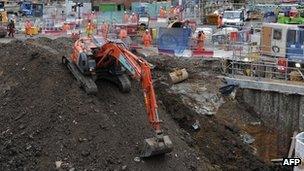MPs question government's infrastructure spending plans
- Published

The PAC said the government had to be 'realistic' about what infrastructure funds its can raise
MPs on the Public Accounts Committee (PAC) have questioned whether the government's £310bn infrastructure spending plans are "credible".
Under the National Infrastructure Plan, which was launched in 2010, the Treasury expects that £200bn of the total will come from private funds.
The PAC report questioned whether both the public and private money can be raised in the current economic climate.
The Treasury said it did not agree with the committee's depiction of its plans.
A spokesman said: "Planning and delivering vital long-term infrastructure is a central economic priority, that's why we launched the first ever National Infrastructure Plan, setting out a strategic approach that monitors the performance of our key infrastructure sectors and identifies the projects needed to build an economy fit for the future.
"Government regularly monitors progress and at the Budget published details of delivery of the top 40 infrastructure projects."
Deputy Prime Minister Nick Clegg also defended the government's infrastructure spending in a BBC interview on Sunday.
He told the BBC's Sunday Politics programme that an additional £3bn of government infrastructure spending in last month's Budget, and that the government was guaranteeing £80bn of private sector infrastructure spending.
But Chris Leslie, Labour's shadow financial secretary to the Treasury, said cuts to capital spending have meant "the Tory-led government has seen over £5bn less in capital investment in its first three years when compared to the plans inherited from Labour".
"We urgently need a plan for jobs and growth, including bringing forward infrastructure investment and building thousands of affordable homes," he said.
'Not convinced'
The PAC urged the government to be "realistic" about how much money would be raised.
It said: "We are not convinced that a plan requiring £310bn of investment in infrastructure is credible given the current economic climate, the cutbacks in public finances and the difficulty in raising private finance for projects on acceptable terms."
Its report added that consumers will shoulder the main burden of increased infrastructure spending, though higher rail fares and utility bills.
However, the PAC did say that it supported the need for more infrastructure spending, saying that investment in energy generation, roads, railways, airports, ports and communication systems was "crucial for stimulating economic growth".
'Higher bills'
The PAC report went to say that the government needed to do more to prioritise the various infrastructure programmes it is backing, warning there were 200 projects "whose relative priority is not clear".
It also said that private sector investors would be reluctant to get involved "until government policy is clear and consistent".
PAC chair Margaret Hodge said: "The Treasury's Infrastructure Plan is simply a long list of projects requiring huge amounts of money, not a real plan with a strategic vision and clear priorities.
"Most of the £310bn of investment needed will come from the private sector, with households shouldering the cost through higher energy bills and fares.
"The government needs to urgently assess the impact on consumers and how this can be contained."
- Published20 March 2013
- Published21 January 2013
- Published16 January 2013
- Published20 July 2012
- Published18 July 2012